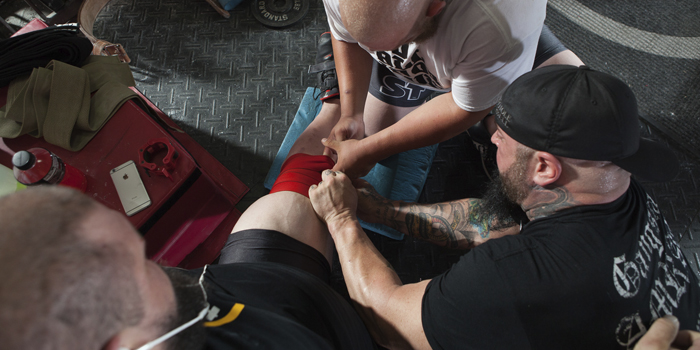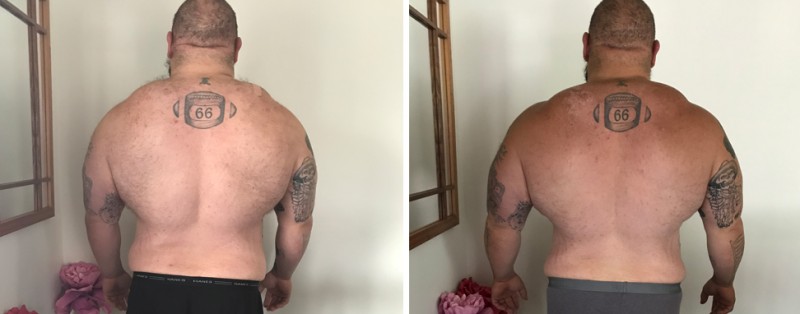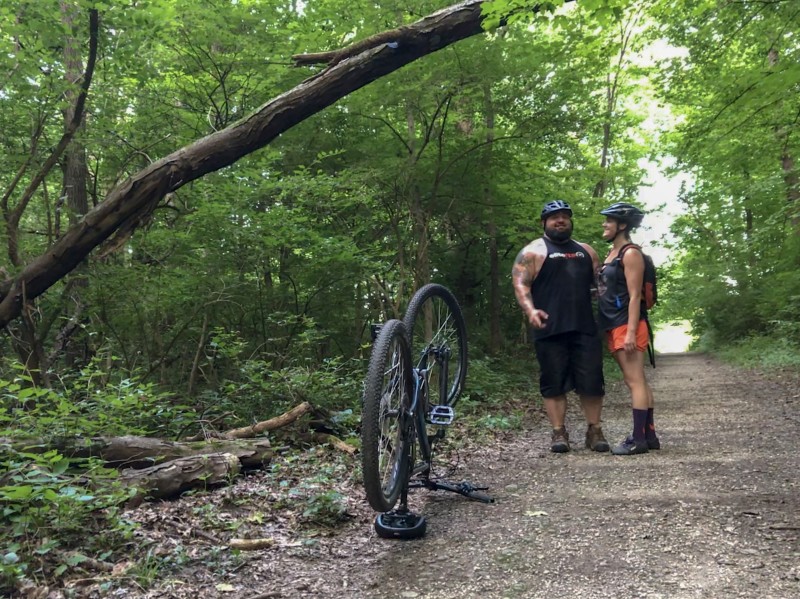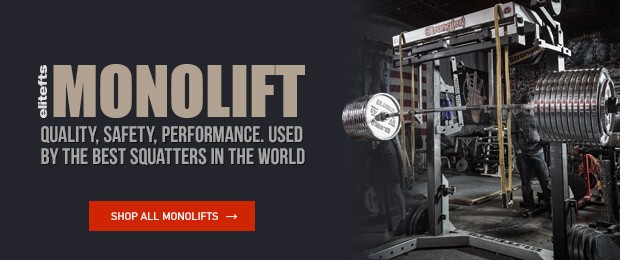
It all started about two weeks post-Arnold, when I secured my second win back-to-back. I did what I'd always done—push the limits, take drugs, and eat food—and with that, I got great at driving people away. I think that's a whole other discussion, so let's stay the course and get to it.
On the day of the meet, I was a nice soggy three-eighty-something. The day after, I felt like shit health wise, my blood pressure (BP) was fucked, and my overall health was terrible—well, at least I assume it was, as I don't dare see a physician in a three-week radius from a meet.
RECENT: 5 Powerlifting Lessons I Flunked Day One
I'm 38 as I write this 20 weeks post meet. I'm down 40 pounds (340). My BP is just about perfect, and my resting heart rate is in the low 60s most days—not bad for being a bathing ape. I'm healthy, but I'm weak as fuck. I know, I know—Mr. Go All In, Mr. No Gray Area Finding Some Balance? Psh, check this out.
I started "dieting" 20 weeks ago—not a get-diced-and-peeled diet but rather more of a pull-the-hot-rod-in-the-shop-and-strip-it-down-and-get-ready-for-next-season type of diet. This was all brought on by Sheena; at the time, I'm not sure she knew what she was signing up for, but she's Irish and tough as nails, thankfully.
Try telling a SHW what he can eat—and more importantly what he can't eat—pure bravery. Add in a bi-weekly picture check-in and I'm already feeling like a fucking weirdo. Taking pictures? Man, I got a face for radio that ain't me, but let's do this.

Week 1 / Week 18
After a couple of weeks, the water came off, the BP dropped, and a couple of physical issues I‘d been dealing with were either cleared up or nonexistent at this point. Fast-forward a couple of more weeks, I stayed the same weight consecutively for two weeks in a row, and boom—I lost a whole day of carbs minus pre-bedtime to help to promote a good night's rest. This wasn't as terrible as it sounds, especially to the fat boys. At this point, I still had a cheat meal every Saturday night. A "cheat" consists of steak (more substantial than normal portions but not by much), potatoes, salad (with full-fat dressing), either a biscuit or garlic bread (sometimes two pieces), and either a big homemade cookie or a half cup of ice cream. That's it—no crazy Dave Tate 12-hour extended cheat meal (unfortunately).
Fast-forward a couple more weeks and I'm down to two carb-free days, Monday and Friday. Luckily, both still include carbs pre-bed. At this point, I'm sleeping better, I'm biking between 10 and 30 miles several times weekly, and overall, I'm feeling like a ninja. I'm gas-station ready as fuck, and I wish a motherfucker wood like a kitchen cabinet. No, no, I don't; I'm 38, and I keep the 40 on me like an ID. Okay, okay, you get the point—I feel good.
So, me being me, I'm going to rebel, and it all started with not touching a bar. The complaints began about seven or eight weeks in. In my competitive mind, the thoughts went like this: How in the living fucking fuck (a verbatim quote) could I be getting stronger or even maintaining strength without the big three? Losing weight, too, I began to get discouraged.
During training, I began to have a hard time understanding this process. It's new to me, and ignorance is blinding. The diet mentally began to have a negative impact on my performance. I'd start showing an attitude during training, and I was beginning to think “what the fuck did I do?” The Arnold is eight months out, and I HAVE to win again. I've put too many people through too much not to win. I'll earn my regrets—watch me.
Push-ups, pull-ups, footwork drills, and more of an athletic style of training have consumed me over the past 20 weeks, and now that I've gotten back under the bar, I'm lost. I'm weak, I'm nervous, and for the most part, I’m regrettably lighter and in shape. I know it sounds absurd, but I'm wired to increase my total no matter what. It's a gift and a curse—trust me.
Sheena, bless her soul, has had to deal with this firsthand, and trust me, I'm a 340-pound spaz. She's patient; she tries tirelessly to make it click in my thick, stubborn Irish skull.
I can't take much criticism when it comes to lifting. My first retort when things aren't going my way is, yeah, you ever squat a grand? Having a 150-pound person telling me stuff about training wasn't an easy adjustment. That's just a simple, uneducated, and insecure defense mechanism. I'm a fighter. Am I strong right now? Nope, not even close, but I'm in great shape, and my work capacity is at an all-time high.
Let's say you have a training max of 10 and you get right back to work after a big meet. You take some time off and clean up a bit. Two weeks go by and you’re back under the bar, starting at maybe a four or a five. What if you took the time to lower that level to a zero and got it back? Yes, it's going to be an adjustment—similar to coming back from an injury but with a clean slate and good health. In this way, you are setting yourself up for so much more room to succeed.
RELATED: How Often Should You Deload?
The next few weeks and months will either one, make this write-up (yes, finally a way to say something other than "article"—I hate that word) look stupid as fuck, or two, prove that we as lifters need to take care of ourselves for longevity purposes and to maximize our performances. We're always willing to try things that could—and do—fuck us up mentally and/or physically, yet we shun the idea of taking a practical approach.
Well, to be honest, if this doesn't work, I'm going to bang a gram of Tren—said for entertainment purposes (wink wink)—and eat a bowl of Dbol O's for breakfast (haha, nah, just kidding—kind of). The point is that I'm willing to take chances to realize what does and doesn't work for me. This is another chapter of testing on the never-ending quest to find my true human potential.
With every experience—good or bad—we have on our journeys around the sun, lessons are learned. These past 20 weeks have been disheartening at times yet eyeopening. Here’s a list of some key takeaways:
Bodyweight Exercises
Pushups have been an especially enormous benefit. My first bench peaking for the 2018 Arnold was 485 for a single. As I've said above, I haven't touched a bar in 20-plus weeks, and during my first time on a bar testing to set some training numbers, I, at 40 pounds lighter hit 485. I completed assisted pull-ups, one-legged box squats, and lunges, to mention a few, that forced my body to work. It was a shock to me that we as powerlifters get away from such simple and effective movements. I know right now that pushups will stay in my arsenal up until the meet.
Conditioning
Kayaking, biking, hiking, walking, swimming—all of these are fun outdoor activities. Work capacity is something that has piqued my interest lately. The higher the work capacity, the easier it is to recover. Imagine spending months on the couch catching up on your DVR and you try to train—you'll be sore as fuck for days. That's what zero work capacity feels like. Now the flip of that coin is trying to simply do the abovementioned for months and then giving training a shot. Sure, you'll be wrecked, but it's going to be a night-and-day difference, especially regarding recovery length. Plus, these things can be done with family and friends away from the gym; we all spend entirely too much time.
Accessories
To piggyback off conditioning, I've found doing cluster sets as a way to push volume, push conditioning, and shave some time off being at the gym. Believe it or not, it's nice having a life outside of the gym these days.
A "cluster set" that is laid out in the way in which I apply it is like this: I pick a weight and rep scheme. Now let's say I choose eight reps, with 100 pounds on the triceps pushdowns. I start a timer for five minutes; I do eight reps and rest 15 seconds, do eight reps and rest 15 seconds, and keep doing this until five minutes have expired. This comes out to around 10 sets and 80 reps with a brief rest time, all in five minutes. This is simple and useful for people who have trouble with accessory work.
Diet
So much scientific shit goes along with this. I'm no scientist, and I sure the fuck don't have abs, so if you skim these write-ups (yes! twice now), this is the part to hop over. I'm afraid to say I'll make this short and sweet; usually, that means six paragraphs later, I circle back around and make the point— sometimes. I'll give it a shot, though. If you have the predisposition to be a fat fuck like me and the only thing stopping you from remaking What’s Eating Gilbert Grape is lifting weights, this might be more for you: Eat good, feel good. It sounds like an eighth-grade football coach, but it holds a lot of truth.
Eating is right there with sleeping, and the better you feed the engine, the cleaner, longer, and stronger it'll run. Shoot for 85% clean, and if you hit a meal or a day where you derail (we all do), make sure that your next few days or meals are extra clean until you reset. I’m not a math wiz, but make sure that out of 10 meals, eight-and-a-half of them are clean. As I reach the end of the second paragraph of "short but sweet," I'll end with this: A sniper doesn't build the perfect rifle and shoot Walmart rounds through it. Fuel the engine properly, add some quality sleep, and you'd be surprised that you won't have to add so many clicks next time you start peaking.
Eating clean, sleeping as much as humanly possible, and training volume are all secure, healthy ace cards. Everyone is so quick to up the dose to lift the most; nobody wants to try to set himself or herself up with minimal supplementation. Imagine getting to where you have been before with just sleep, training volume, and food and THEN you hit the gas—that's where I am now and will remain. Follow my log and see how it all plays out; the worst thing that happens is I'll learn just a little more about myself, and if I fail and learn a lesson as a result, do I even fail?
It's still #FYFM.












1 Comment